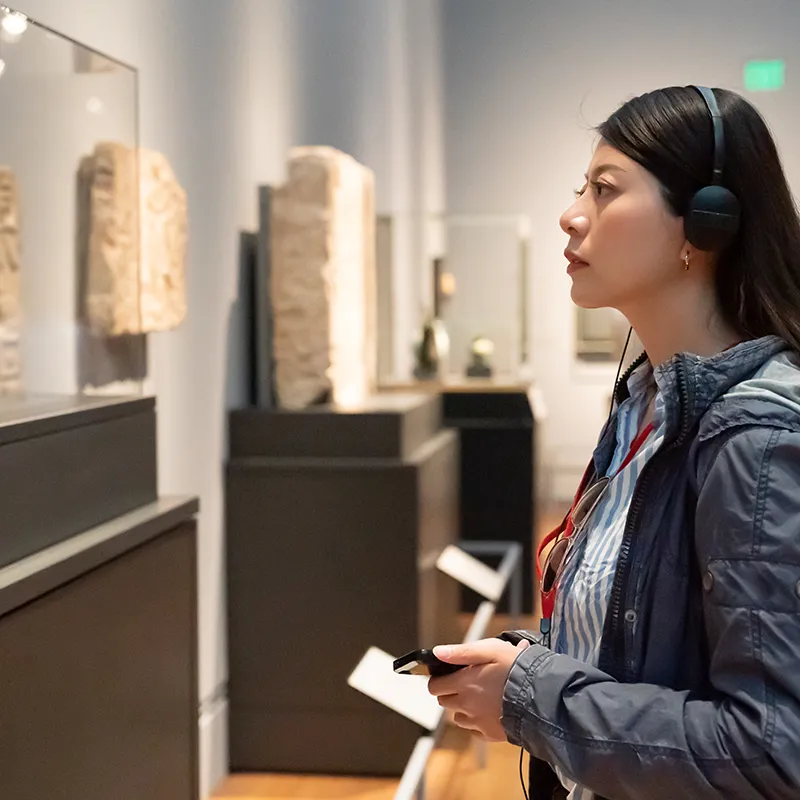History
Bachelor of
Arts in
History


History is the study of the distant and current past: its peoples, societies, cultures, events, challenges, and more.
History is a debate about how to interpret “facts” and the causes, consequences, and significance of past events. Since the past has shaped the present, history is essential to understanding today’s issues, dilemmas, and opportunities. As William Faulkner noted, “The past is never dead. It’s not even past.” History—the study and interpretation of human experience over time—is central to the humanities and liberal arts. As the American Historical Association notes, “everything has a history, including people.”
A B.A. in History from GCU is an exceptionally versatile degree that prepares you for a job in government, politics, law, journalism, editing, business, banking, museums, libraries, nonprofits, tourism, and education, as well as graduate and professional studies. Our history program emphasizes practical skills that employers value and seek: the ability to read critically, think logically, communicate effectively, conduct research, conceptualize, and understand and embrace diverse cultures and peoples.
GCU also offers a minor in history and a minor in politics, law & history.

Why Study History at GCU?
- All history courses are designed to be interactive discussion-based courses, not lectures, and our history program emphasizes reading, writing and research, not memorization.
- Since electives make up half of the history program, you’ll have the flexibility to study what interests you most.
- You’ll have the opportunity to work on research projects with faculty mentors that will provide a deep dive into an area of interest to you, while also developing critical skills today’s employers demand and graduate programs seek.
- Courses like Rebels & Radicalism in U.S. History, Gandhi & King, and Comparative Empires will forever change your perspectives and prove that history is interesting and enjoyable.
- Join the History Club, open to all students, and participate in trips to historic locations, museum tours, conferences, paper presentations, and campus events with like-minded students.

What Students Might Be Interested in History?
If you’re fascinated by the past and the world and interested in how its cultures, peoples, and events shape us today, a history degree is a great choice for you. And, if you’re committed to social justice, you’ll be inspired by historians who expose social injustice and bolster social reform. You’ll be encouraged to consider the ethical dimension in historical analysis.

What Can I do with a History Degree?
Graduates from GCU’s history program are teachers, lawyers, journalists, museum curators, archivists, and librarians, among other professions, and many have earned graduate and professional degrees. Others—including history majors—also expand their horizons by earning a minor in Law, Politics, and History. A sampling of careers and median annual salaries are shown below. Note jobs that require a double major, minor, and/or an advanced degree and additional certifications and licensures are marked with an asterisk. Salaries are dependent on experience.
- Journalist - $48,370
- Paralegal/Legal Assistant* - $56,230
- High School Teacher* - $61,820
- Historian - $63,940
- Librarian* - $61,190
- Writer/Author - $ 69,510
- Public Policy Analyst* - $87,270
- Lobbyist - $116,800
- Lawyer* - $135,740
- U.S. Senator - $174,000
B.A. in History Program Information
You’ll need to successfully complete at least 120 credits, including General Education requirements and 36 semester hours of coursework in history: A maximum of 12 credits in 100-level courses, a maximum of 6 credits in 200-level courses, and 18 credits in 300- and 400-level courses in the major. GCU’s history degree is one of the most flexible on campus.
To earn this degree, students must successfully complete at least 120 credits, including General Education requirements and the major requirements below.
Major Sequence
A maximum of four 100-level courses will be accepted in the major. A maximum of two 200-level courses will be accepted in the major. (History majors can use PO211 American National Government to satisfy one 200-level History Elective). History majors will be required to take 36 semester hours in history to earn the Bachelor of Arts (B.A.) degree. History majors cannot use any HST course or PO211 American National Government to fulfill any IMPACT general education program course requirement. Majors take:
| Code | Title | Credits |
|---|---|---|
| HST110 | U.S. History Survey I 1 | 3.0 |
| HST111 | U.S. History Survey II 1 | 3.0 |
| HST120 | World History Survey I | 3.0 |
| HST121 | World History Survey II | 3.0 |
| 300- and 400-level courses (excluding internships) 2 | 18.0 | |
| Additional courses above the 100-level | 6.0 | |
| Total Credits | 36.0 | |
- 1
History majors can use HST150 African American History to satisfy either the HST110 U.S. History Survey I or the HST111 U.S. History Survey II requirement, but not both. A transfer course on African American History 1619-Present will be accepted in place of either HST110 or HST 111, but not both.
- 2
Including HST300 Historian’s Craft and HST475 History Seminar.
History majors (but not others) must complete HST300 Historian’s Craft with a C- or higher, prior to or concurrent with enrollment in 200-/300-/ 400-level history courses.
To successfully exit the department, majors are required to earn a minimum grade of C- on the HST475 History Seminar research paper, a minimum grade of C- in HST475 History Seminar, and a minimum final grade point average of 2.5 in the major.
A maximum of 18 approved credits for the history major may be accepted in transfer, and 9 approved credits for the history minor.
For more information on program requirements, consult the Undergraduate Catalog.

Scott H. Bennett, Ph.D.
Professor of History
School of Arts, Sciences, and Education
Jeffries Hall (107)
sbennett@georgian.edu
732-987-2347

Annie C. Humphrey, Ph.D.
Visiting Professor of History
School of Arts, Sciences, and Education
Jeffries Hall 127
ahumphrey@georgian.edu
If you’re interested in our history program, here are other programs at GCU you might be interested in exploring:

Request More Info
IMAGINE YOUR FUTURE AT
GEORGIAN COURT
LEARN HOW TO APPLY
We make applying easy. Get all the details on what you need to start your journey at GCU.
Visit Us
Seeing is believing. Take a look at our campus by driving, walking, or exploring our virtual tour.
GET MORE INFORMATION
Reach out to us and learn more about all GCU has to offer you.
